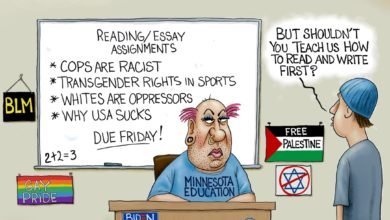Law School Org Hosts Conference On How To Keep Racially Discriminating In Admissions

The Association of American Law Schools (AALS) held a conference in July discussing how higher education institutions can continue to racially discriminate, following a ruling by the Supreme Court banning race-based admissions policies, according to videos reviewed by the Daily Caller News Foundation.
In June, the Supreme Court ruled that Harvard University and the University of North Carolina’s use of race-based admissions policies is unconstitutional, halting the practice in all higher education institutions. In early July, AALS held a conference featuring several panels and speakers who suggested institutions use recruiting tactics, diversity statements as well as “data and analysis” to increase racial diversity.
“There’s much that we are going to talk about this morning that’s left uncertain for the Supreme Court’s ruling and there is going to be litigation about it but I think it’s important that they’re not premature capitulation,” Erwin Chemerinsky, the former president of AALS and dean of the UC Berkeley School of Law, said in the video. “I think it’s important that colleges and universities continue complying with the spirit — the letter of the law to pursue diversity but understanding that some of it is going to be challenged in court. We might win some of those, we might lose some of those.”
Assistant deans from three law schools in states that have already restricted the use of racial preferences in the admissions process before the Supreme Court’s decision — Washington, Arizona and California — shared insights on maintaining diversity through pipeline programs, diversity statements and more, the video shows.
“A lot of us have looked this problem square in the eye before, or this issue, and have come up with creative solutions to maintain the kinds of classes that we want,” Cary Lee Cluck, University of Arizona James E. Rogers College of Law Assistant Dean, said during the seminar. “This is just another moment in time where we have to stop and reassess.”
Kristin Theis-Alvarez, assistant dean of Admissions and Financial Aid at the UC Berkeley School of Law, noted Berkeley has a four-page personal statement that was a “direct outcome” of California’s Proposition 209 in 1996, which put a stop to affirmative action in the state, according to the seminar. The school also allows applicants to submit an optional socioeconomic questionnaire and diversity statement rather than explicitly asking for race during the admissions process, Theis-Alvarez said.
“In the past, applicants have included information about such things as gender identity, sexual orientation, race and ethnicity, disability, socio-economic background, being a first-generation college student or graduate student, being a student parent a re-entry student, their geographic diversity or ideological diversity and others,” Theis-Alvarez said.
Theis-Alvarez later advised schools to embrace “data and analysis” for whatever programs they choose to implement.
“So for example, you know, asking the question of okay, this happened…we only enrolled 12 African-American students,” she said. “There’s all kinds of people who are going to have all kinds of opinions about what went wrong. Data is your friend.”
“What was the national applicant pool like? How many applications did you get? What were the outcomes of those applications and then what was the yield rate on those individuals?” she continued. “If you can’t do everything, trying to assess whether or not it’s better to do more outreach related things to get people to come as applicants or whether it’s better to do something that’s related to yield because you weren’t converting people from admits to matriculants becomes a really high stakes question.”
A third panel discussion focused on the issues left open by the Supreme Court’s ruling and what kinds of solutions may prompt litigation.
The Thomas Jefferson High School for Science and Technology case out of the Fourth Circuit, which considers the school’s racial balancing practices in the admissions process, remains one of the biggest questions left open, panelists said, according to a video of the conference.
“How do we approach race conscious but also race neutral means to achieve greater, or at least protect, diversity gains?” Timothy Lynch, University of Michigan Vice President and General Counsel, said, explaining the question posed by the case.
The moderator of the conference later posed a question about the legality of scholarships that are offered to students who attended a Historically Black College or University. This, along with many proposals, comes down to your institution’s “appetite for risk,” Lynch said.
“It’s how you go about stating from the onset why you are doing this,” he said. “The students who attend minority serving institutions will in many cases have overcome different challenges in life.”
“You’re all good lawyers,” Lynch continued. “You need to come up with reasoned arguments as to why that intent is appropriate.”
Lynch later noted that “litigation risk is pretty low” for targeted recruiting and outreach programs.
“If you’re the University of California, you don’t have trouble getting applicants from Beverly Hills, while you do have trouble getting applicants from East L.A and South Central L.A. ” Kevin R. Johnson, Dean and Mabie-Apallas Professor of Public Interest Law and Chicana/o Studies at the UC Davis School of Law, agreed. “If you’re interested in maximizing your applicant pool, you’d probably focus less in Beverly Hills and more on South Central and East L.A in terms of getting applicants.”
On Tuesday, the U.S. Department of Education’s (DOE) Office for Civil Rights and the U.S. Department of Justice’s Civil Rights Division released guidance encouraging universities to navigate the Supreme Court’s affirmative action ruling by weighing “ways a student’s background, including experiences linked to their race, have shaped their lives and the unique contributions they can make to campus.” The guidance notes that institutions can partner with K-12 schools to create pathway programs, and give preferential treatment to students that are in the program during the admissions process if they were admitted to the program based on non-racial criteria.
“I do not think that anyone who spoke urged ‘skirting’ the Supreme Court’s decision,” Chemerinsky told the Daily Caller News Foundation. “The assumption of the conference was that schools will comply in good faith with the Court’s ruling. The Court does not preclude schools from pursuing diversity, so long as the means are lawful. We discussed what might be those lawful means and also places where the law is uncertain.”
The Association of American Law Schools, Cluck, Theis-Alvarez, Lynch and Johnson did not immediately respond to the Daily Caller News Foundation’s request for comment.
Content created by The Daily Caller News Foundation is available without charge to any eligible news publisher that can provide a large audience. For licensing opportunities of our original content, please contact licensing@dailycallernewsfoundation.org




